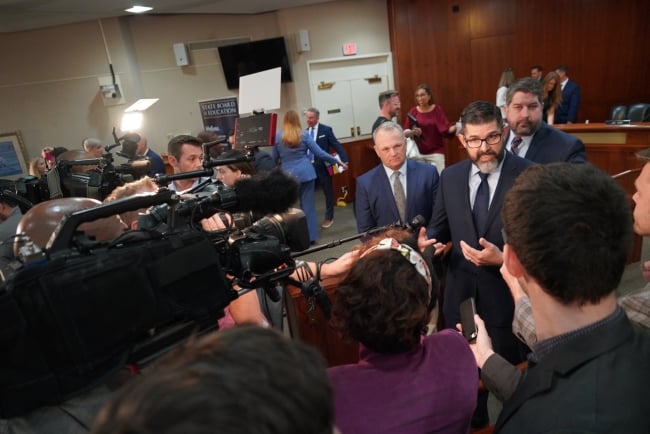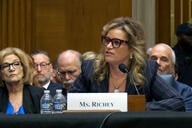You have /5 articles left.
Sign up for a free account or log in.

Florida education commissioner Manny Diaz Jr. answers reporters’ questions.
Manny Diaz Jr./Facebook
The College Board, which operates the Advanced Placement program, announced Thursday that it will not recognize AP Psychology courses taught in Florida public high schools because the state Department of Education is requiring that psychology courses omit lessons on gender identity and sexual orientation.
The College Board said in a statement that the decision was made after the organization learned that the education department is requiring the course omissions. The College Board statement said the prohibition would “censor college-level standards for credit, placement, and career readiness.”
“The Florida Department of Education has effectively banned AP Psychology,” the statement said.
The College Board’s action follows an earlier move in January by the education department, under the dictates of Governor Ron DeSantis, to bar schools from offering the new AP African American Studies course.
Material on gender identity and sexual orientation has been part of the AP Psychology course for 30 years, but it will not be recognized as Advanced Placement and cannot be designated AP Psychology on student transcripts under the Florida restrictions, the College Board statement said.
The announcement comes just eight days before most Florida schools are set to reopen following the summer break. According to last year’s AP enrollment data, more than 28,000 Florida students took the AP Psychology course.
“The state’s ban of this content removes choice from parents and students,” the College Board said. “It derails the college readiness and affordability plans of tens of thousands of Florida students currently registered for AP Psychology, one of the most popular AP classes in the state.”
The state ban is the culmination of months of debate and confusion about the psychology course.
Last May, following a vote by the State Board of Education that barred all instruction on gender and sexuality unless “expressly required” in state standards, the Department of Education asked the College Board and International Baccalaureate to confirm that their college-level Psychology courses would adhere to the restrictions. International Baccalaureate said it would do so. The College Board said it would not.
“Doing so would break the fundamental promise of AP: colleges wouldn’t broadly accept that course for credit and that course wouldn’t prepare students for careers in the discipline,” the College Board said.
Despite the College Board’s refusal, the Florida Board of Education approved the AP Psychology course, leaving school officials confused about the earlier restrictions. A meeting held Thursday between state officials and superintendents was supposed to clear things up, according to The Tampa Bay Times. But instead, a participant in the private conference informed the College Board that Florida would not be changing its policies, prompting the College Board to act.
Andrew Spar, president of the Florida Education Association, the state federation of teachers’ and other education workers’ labor unions, said he’s “not only disappointed,” he’s also “angry.”
“These are courses that parents opt for their students to take,” Spar said. “They’re not required courses. The state of Florida, which keeps saying they’re all about parental rights, clearly is indicating that parents don’t have the right to decide what their kids learn in school if the governor disagrees with what’s being taught.”
“So as a parent, my rights are being violated every day by the governor of the state of Florida. And as an educator and as a unionist, I continue to talk to my colleagues all over the state, who are very frustrated,” he added.
The American Psychological Association also criticized the Board of Education’s decision and said it supports the College Board’s action.
“Agreeing to use what is effectively censored educational material does an enormous disservice to students across Florida, who will receive an incomplete picture of the psychological research into human development,” the association’s CEO, Arthur C. Evans Jr., said in a press release. “Educators should not be required for purely political reasons to censor a curriculum and test that are grounded in the latest, most reliable research. And psychology professors cannot and should not accept for college credit a course that ignores a critical aspect of sexuality and an entire group of people from its curriculum.”
Kasey Meehan, director of the Freedom to Read program at PEN America, said in a statement that while the cost to students who intended to use the AP Psychology course for college credit is “painfully clear,” the cost of “Florida’s yearslong campaign of censorship,” which disproportionately targets LGBTQ+ students, is “unquantifiable.”
“This level of ideologically-motivated state intervention is forcing teachers and schools into impossible positions, and undermining students’ futures as informed citizens. We applaud the College Board for maintaining the integrity of their course in the face of state intimidation, and we implore the state of Florida to end its assault on public education,” Meehan said in the statement.
This is not Florida’s first skirmish with the College Board. The state’s decision to ban AP African American Studies at the beginning of the year was one of several factors that led the organization to make changes to the course.




